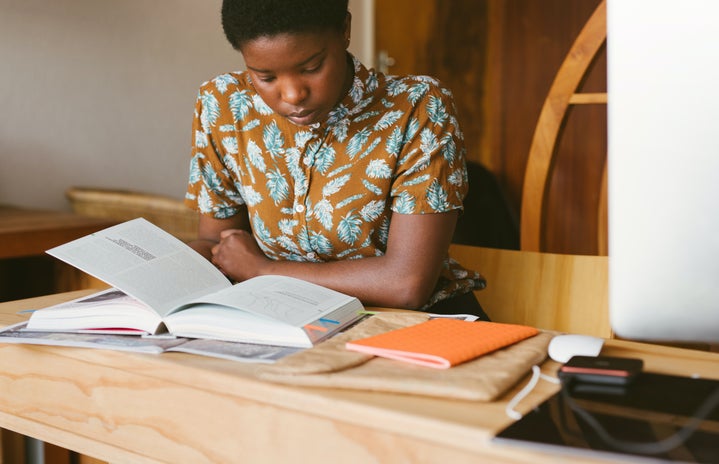After white and Non-Black folks rode the performative activism wave last year, what’s next? Many filled their Instagram feeds with Black squares and the “I see you and I hear you,” sentiments; however, very little accountability and actions have been taken. Being Black and navigating predominately white spaces is not only taxing, it is especially challenging each aspect of common sense and human decency has to be a learning moment for the person causing harm. One of the biggest problems concerning educational spaces is the centering of whiteness and the coddling of white feelings and tears. When you are a Black woman and unapologetic in these spaces, you are always branded to be “difficult” and always “picking a fight.” But, hardly ever is it considered the importance of recognizing how folks of privileged experiences take up too much space and fail to be accountable for how they allow entitlement and self-indulgence to breed arrogance and Anti-Blackness. Whenever light-skinned folks of color and white feminists use classroom settings to voice what’s already been said, that is when folks listen. However, when those who are impacted by colorism, Anti-Blackness and microaggressions offer their opinions, many times such a process is like speaking into a void. At this point, where we are, no one can say, “I did not know.” The thing is, you are aware of what continues to be done and how your words do not amount to support or accountability. With that being said, there is an unwillingness to be accountable and to recognize that as white and Non-Black people, not everything requires your opinion or unfiltered thoughts. Why is this important you ask? As an Integrative Studies (with a concentration in Social Justice and Human Rights), many spaces are devoted to the white leftists and “well-intentioned” white feminists trying to do their part, while Black pain and trauma are the basis of many courses, spaces and conversations. The disillusion of social media activism is connected to how folks do not keep the same energy in these spaces where their silence is complicity and their reliance on Black students educating them or “elaborating” on their experiences are just two additional ways to avoid putting in the work and recognizing that harm is being done when speaking over Black students and peers=, who have our unique and valid perspectives. Here are some things to keep in mind.
Experiences Over Assumptions.
If you are a white and Non-Black person, it is crucial to actively listen. In spaces, if you are selective and only hear to respond, that is on you. It is your responsibility to recognize that you can not speak to an experience you do not have. To make assumptions and to put words in people’s mouths is to symbolize defensiveness and the yearning to find something to nitpick about what is being said. Folks’ lived experiences hold more weight over your thoughts and opinions.
Be Respectful and Mindful of Consequences.
There is no reason for a lack of accountability concerning your actions. If you approach situations unwillingly to fully learn and analyze the behaviors you have internalized, then what is the point? Many are solely infatuated with taking courses or being in spaces to fulfill a credit to the point where there is no sincerity about what is being taught and the importance of then actually tacking what is being taught and translating such into persistent action plans to better support marginalized communities, particularly Black and Brown communities. Parts of being respectful are being attentive, actively listening, supporting Black peers within these spaces (not private co-signing) and not interrupting Black and Brown folks when in spaces. Your job is not to negate or to question.
Words and Impact Are Everything.
Be mindful of your words and tone. Speaking in a demeaning way and expecting folks whom you’ve disrespected to meet you halfway is not how this works. Your intent does not matter. Your impact does. Oftentimes in spaces I have occupied, many have addressed me with certain energy then when I simply returned the same right back then it becomes a withdrawal as if that was not their intent. In this climate, you are adult enough to know and understand that your approach and attitude are vital. And no, under no circumstances are folks obligated to hear you out or hear what you are saying because you want to prove how smart you are in a space. Part of accountability is recognizing that you need to recognize where you have harmed people and grow from that.
If It Is Not Intersectional, Keep It.
You can not speak of environmental injustice, women’s rights, capitalism, etc., without centering how all of those issues and systems are connected to white supremacy and systems of oppression. Each conversation and space should be intersectional and intentional. To not explicitly state the impact of race, gender, class, sexuality, etc., is to ignore how identities are connected, especially in the case of Black and Brown people. White feminism in spaces promotes the girl boss idea of “anyone being able to anything,” which we know is not true. Your language and approach should always center marginalized communities first.
Your Feelings and Fragility Are Not My Problems.
I will never make myself an apology for the sake of your ego and inability to take and center critique. It is not the job of Black people to center your feelings and make spaces for you; meanwhile, your harm and inability to make spaces for us speaks volumes. We do not owe anyone anything and it is crucial to note that if you are more concerned with how you feel over the safety and affirmation of Black and Brown folks and communities thus symbolizes your privilege and positionality.
Yes, White Professors.
White professors are not above being checked. No matter their “credentials” or degrees, those aspects do not matter more than lived experiences. Black and Brown students do not owe niceness or politeness when our lives are often the topics of discussion for these courses; taught by white professors who are deeply in their privilege to even have those positions. The white professor teaching social justice courses pipeline not only limits the potential safe spaces of conversation but there is also limited accountability and reflection being had, front-and-center. Those who have positionality and power will never seek to give those things up or recognize the fact that no matter what, their whiteness will always serve as a shield and protection.
“Diversity and Inclusion.”
Tokenism and representation are not the same. To expect Black and Brown people and students to do things for free or without support is an insult. There is a lot of labor and work that goes into these spaces; all of which we do not owe to anyone (as stated before). The nature of these environments both in-person and virtual promotes the idea of having more “diverse” communities as much as possible. But, are you holding space for them? Are you compensating them for their work? Are you positioning them as the one person to speak about a certain issue? Is diversity and inclusion just having light-skinned folks (once again) at the center, while allowing colorism to also permeate your spaces? University spaces, curricula and overall environments use “diversity and inclusion” to serve as a protection ploy for themselves while boosting up their profiles for incoming freshmen in order to showcase how “inclusive” their spaces are. Is it really inclusive or do you have surface-level “initiatives” that are not transparent, intersectional or supportive of marginalized students? The safety, protection, and unapologetic centering of Black, Brown, Queer, Trans, Disasbled, and Neurodivergent students, faculty, and staff should always be priority number one. Change is at the root. Resistance and disruption are needed to change the tides while amplifying those who are continuing to be impacted by policies and actions built to their detriment.
To be honest, many of us are tired of the reminding and of the “teaching.” It’s your job and responsibility to be mindful of how you take up and occupy space. I do not need you to give me compliments about how “brave” or “strong” I am. There needs to be persistent actions and less words. There needs to be more accountability and showing up where you are not engaging in what-about-isms or being Anti-Black. There needs to be more of your role and how to be better. Words have never sufficed and they will not now.


